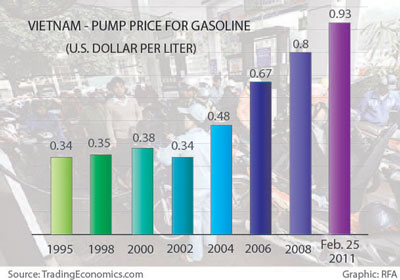Fuel prices in Vietnam jumped by 18 percent Thursday, threatening to further increase already high inflation following devaluation of the country’s beleaguered currency.
Motorists stood in long lines at the pump to purchase gas before the hike went into effect, causing traffic congestion in cities.
Even though the government subsidizes fuel prices, economists had expected a rise in gas costs after Vietnam devalued its dong currency for the fourth time since 2009 this month.
The devaluation increased the cost of imported gas, which had jumped 20 percent in the last week to a two-year high of U.S. $102 a barrel worldwide on Thursday, amid fears of instability in the Middle East.
The government said it was “necessary” to raise the state-set fuel price of 16,400 dong (U.S. $0.78) per liter to 19,300 dong (U.S. $0.93), despite the effect it would have on inflation, already at a two-year high.
The cost of diesel fuel also rose by nearly 24 percent to 18,300 dong (U.S. $0.87) on Thursday.
Ngo Tri Long, former deputy head of the Market and Price Research Institute under Vietnam’s Ministry of Finance, said the government was forced to hike the price of gas in order to bring costs in line with the rest of the world.
“Gas is an essential good that can have a domino effect on the economy … The government has been subsidizing the gas price for a long time through a ‘stability fund,’ but it can’t take the burden any more. It has to make sure that the domestic price is equal to the world price,” he said.
Ngo Tri Long added that Hanoi had waited until Thursday to enforce the hike because the government did not want to anger the people during the Tet New Year festival in the first week of February.
Heavy subsidies
Gas prices in Vietnam have continued to increase since 2002.
RFA
He said the gas pricing mechanism had not worked effectively in the past because of the heavy government subsidies.
“Gas prices should be controlled in accordance to market fluctuations, but actually the government has been controlling it for a long time. Now that it has been unlocked we are seeing an explosion that is impacting the entire economy.”
Vu Thi Minh Hang, head of the National Finance Department at the University of Economics in Ho Chi Minh City, said the government had been importing around 70 percent of its annual gas volume.
The nearly nine percent recent dong depreciation “has worsened the cost of imports [and] the gas price had to be adjusted to the new price level,” he said.
Motorists who wanted to beat the 10 a.m. Thursday deadline when the price hike went into effect largely returned home disappointed because of the long lines at the pump.
And Vietnamese are bracing for further increases in the cost of key commodities, including a 15 percent hike in the cost of electricity which will go into effect next month.
Extra costs associated with the gas price hike will be passed on to other industries as well.
Nguyen Huu Anh Tuan, a restaurant owner in central Vietnam, said he will face new costs in nearly all aspects of his work.
“Absolutely, the gas price rise negatively impacts our business. All incoming costs will increase and we assume we will have to pay about 10 percent more for everything including meat, vegetables, rice, and other items,” he said.
“In the short term, we can’t raise our menu prices and will have to live with a reduced net profit for a while.”
The owner of a transportation company in Dac Lac, who asked to remain anonymous, also said his business would face more costs that it would not be able to pass on to the customer.
“The rocketing gas prices directly impact our business, but we can’t in turn charge more to the passengers. Therefore, we are hoping a transportation association will be formed that can guide us on how to increase fares to compensate for the gas price increase.”
Rising inflation
Vietnam is dealing with a runaway inflation that has seen the cost of living increase each month since last August and more than 12 percent in January from a year ago.
Following a meeting with local officials on Thursday to investigate measures to stabilize the economy, Prime Minister Nguyen Tan Dung said he wants state-owned companies to sell U.S. dollars to the central bank to help stabilize the dong exchange rate.
Economist Le Dang Doanh told AFP that the move would strengthen the country’s foreign exchange reserves, which would in turn control the exchange rate and curb inflation.
The sliding dong after the devaluation had prompted companies to hoard U.S. dollars.
Dung has already said he would cut state spending by 10 percent in order to control prices, but some wonder whether the move would be enough given the amount of inefficiency in the state sector.
The Associated Press quoted economist Nguyen Minh Phong as saying that the fuel price hikes and the increase in electricity prices planned for March 1, combined with the devaluation of the dong, will make it impossible for Hanoi to tame inflation to under seven percent.
"We have to prepare to see the annual inflation rate to double the government's target," he said, adding that the living standards of ordinary Vietnamese would suffer.
Reported and translated by Hoang Nguyen for RFA’s Vietnamese service. Written in English by Joshua Lipes.





